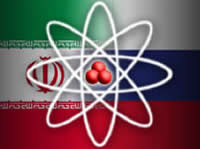Six key nations meet to deal with Iran's suspect nuclear program
Senior diplomats from six key nations that have been struggling to find a successful plan to deal with Iran's suspect nuclear program are meeting Monday to look at new ideas to help defuse the problem.

The high-level representatives from the five veto-wielding Security Council nations, the United States, Russia,China, Britain and France, as well as Germany will be holding talks as the council tries to overcome differences on a statement demanding a quick report on Iran's progress toward clearing up suspicions about its nuclear program.
Ambassadors from the countries attending Monday's meeting stressed that the high-level diplomats would be taking a longer, strategic view of the Iran problem and would not be negotiating the final language of the Security Council statement.
"I hope they'll look at the wider strategy of how we develop our relations with Iran," Britain's U.N. Ambassador Emyr Jones Parry said Friday. "But let's be clear that negotiation of the (statement) will be done in the council."
According to a U.N. diplomat in Vienna, Britain may float a plan at Monday's meeting to draw the United States into new talks with Iran over its nuclear program. Washington has just agreed to talks with Iran over Iraq, and the diplomat said the British proposal would call for nuclear talks with the six countries attending Monday's meeting.
They would offer Tehran a new but unspecified package of incentives in exchange for a negotiated settlement on Iranian plans for uranium enrichment, the diplomat said, speaking on condition of anonymity in exchange for divulging the confidential strategy.
The six countries agree that Iran should not develop nuclear weapons, but they disagree on the best way to get Tehran to halt uranium enrichment, which can be used either in civilian nuclear program to generate electricity or to produce nuclear arms.
Russia and China, which are allies of Iran, have said tough council action could spark an Iranian withdrawal from the Nuclear Nonproliferation Treaty and eventually lead to tougher measures, such as sanctions. They want the IAEA to remain in the lead in dealing with Iran.
The United States, Britain and France want a statement listing demands already made by the IAEA _ including the suspension of uranium enrichment and steps toward greater transparency and more cooperation. The Western powers also want IAEA Director General Mohamed ElBaradei to report to the council on Iran's progress in meeting the demands in 14 days, which Russia and China say is much too soon.
Negotiations between Iran and France, Germany and Britain, acting on behalf of the European Union, collapsed in August after Tehran rejected an incentives package offered in return for a permanent end to uranium enrichment. Its subsequent moves to develop full-blown enrichment capabilities led the IAEA's 35-nation board to ask for Security Council involvement earlier this year.
U.S. Ambassador John Bolton said Monday's meeting "will basically consider the longer range issues, although obviously in the capitals in Moscow and Beijing, certainly, they will now have a look" at the latest text of the Security Council statement, and hopefully the senior diplomats will have instructions "that will allow us to make progress,"reports the AP.
I.L.
Subscribe to Pravda.Ru Telegram channel, Facebook, RSS!




